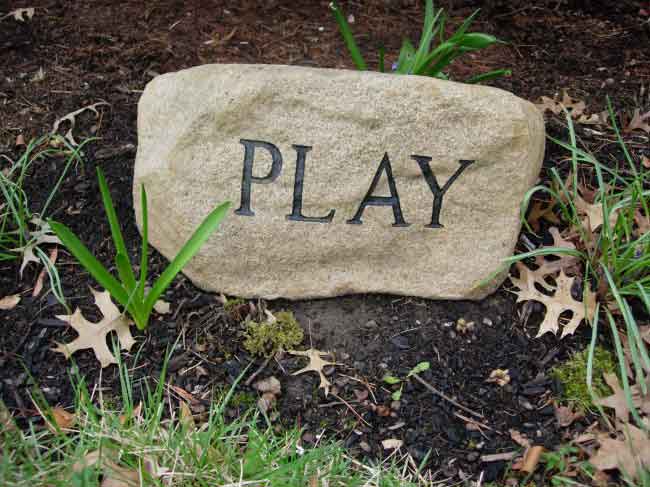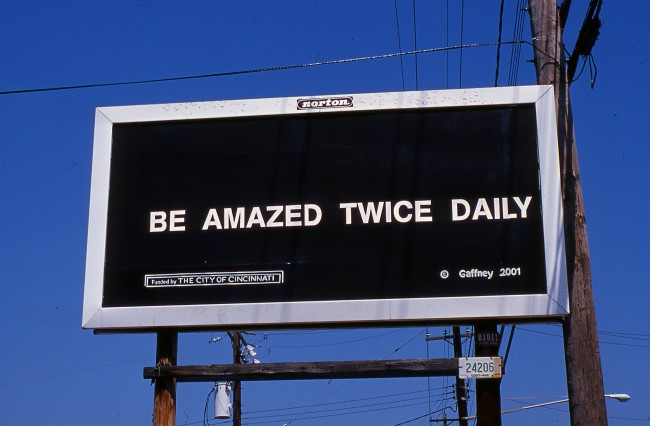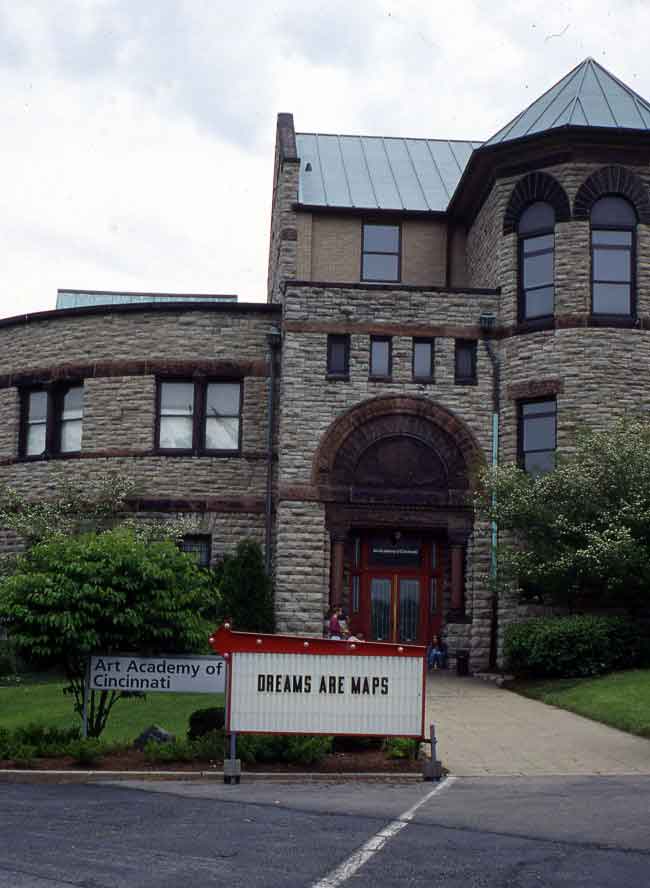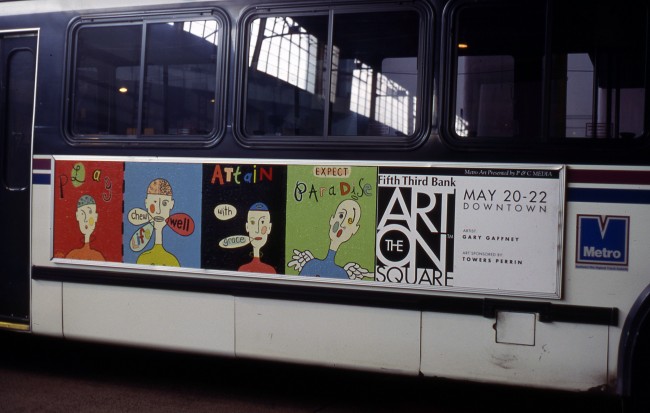ART FOR A BETTER WORLD
By Saad Ghosn
• Images For A Better World: Gary GAFFNEY, Visual Artist
Gary Gaffney, born in New Orleans, LA, is now Professor Emeritus at the Art Academy of Cincinnati after a teaching career of more than 30 years. He has worked in a wide range of visual and literary media. His text-based images are a small effort to subvert the polluting influence of commercial advertising.
“The aim of most advertising is the sales pitch,” he says. “The task is to get us to buy; the bottom line is profit. The strategy is built around manipulation, psychology, creativity (often misplaced) and even subtle deception. Sadly our wants become transformed into our needs.”
Using a grant from the City of Cincinnati Arts Allocation Committee, Gaffney attempted to use some basic and traditional advertising venues to put out a different kind of message, one intended to be thoughtful, encouraging and challenging. His plan was, in some modest way, to subvert the commercial system by offering the public unexpected messages offered in expected venues.
The following sign messages were placed in familiar venues for communicating with the viewers; they asked for more than a few seconds of superficial engagement.

‘Play’ represents one of many stones Gaffney displayed in parks, gardens and public spaces.

‘Practice Being Human’ is one of a series of lawn signs Gaffney placed near streets, intersectionsand highways throughout the city.

‘Be Amazed Twice Daily’ is one of several billboards that Gaffney used for his messages throughout the city; they were visible for anywhere from 2 weeks to more than a month.

‘Dreams Are Maps’ was a message displayed on a mobile sign that Gaffney rented and placed at the Art Academy’s former Eden Park location. For the month-long rental period, he changed the messages regularly.

This ad traveled on a Metro bus. It was meant to be uplifting in design, color and execution and to carry positive and affirming messages.
• Words For A Better World: Donelle DREESE, Literary Artist
Donelle Dreese is the author of two poetry collections: A Wild Turn (Finishing Line Press), and Looking for a Sunday Afternoon (Pudding House Publications). Her poetry and fiction have appeared in publications such as Quiddity International, Hospital Drive, Roanoke Review, Appalachian Heritage, Runes, Gulf Stream Magazine, Journal of Microliterature, Gadfly Online, and Conclave. Donelle is also the author of a book of travel writing, America’s Natural Places: East and Northeast published by Greenwood Press. She is an Associate Professor of English at Northern Kentucky University. Her teaching, research, and writing projects are frequently informed by environmental and social justice issues, a sense of place, spirituality, and gender.
• In “Whole Daughter,” Donelle Dreese expresses the regret and conflicted emotions of a mother whose choices in life were determined by limited social expectations for women.
Whole Daughter
I watch her button her tailored jacket
eyes bright as bay windows with June flower falls.
She zips her briefcase after filtering through
its lofts and staircases where her college courses live.
She is my whole daughter who broke the spell
who redressed the far moon with no role model.
I am her half mother who didn’t know about the choices
who felt her womb open and close each time in the rhythm of sobs
who walked away when they called for me in their vomited beds
because I hated them most when they needed me
who laughed her guilt away with the clamber of glasses
and friends howling late into the night
who spent a decade trying to shake the oil from her fur
not knowing who to burn for the forgery of my life
who chided her daughter for exposing the invention
that I defended like a drafted soldier, programmed and proud
who watches her now in the eve of my resting
and wants to know her, everything about her.
• In “The Soup Peddler” Donelle Dreese paints the portrait of a woman whose life is grounded in simplicity and environmental consciousness. What she has to offer the world is fundamental and nourishing, like the soup she sells.
The Soup Peddler
This isn’t the nineteenth century, mind you,
but there she is peddling her cargo of recipes
through motorized suburbia,
living a principled life by soup and cycle.
When a leaf blows
over her handle bars,
she sees a victory flag,
a geometry lesson,
an open palm.
Each leaf is the ceiling
of a small temple and she rides
beneath thousands of them
delivering a brothy communion.
On her wagon stocked
with chowders and bisques,
the smell of lemongrass and lentils
collides with car exhaust.
Microwave children
with their rusty bike chains
and cell phone games
peer out through the hollow
as her pedal makes another wild turn.
• “Infection” is a portrayal of people caring for one another within an increasingly toxic world that is characterized by polluted waters and bats suffering from white-nose syndrome.
Infection
Like two battered apples
remembering the aftertaste
of orchards
we walked away
from the milky pond’s
putrefying edges
one part regret
two-part sky
for a dappled whole.
The world beyond us
has an inflamed chemical heart
an infection
that doesn’t coalesce
with the soft fog
of your face. Here
is my cold compress
for your hot, barn-high brow.
Won’t you sing with me
over clean squash blossoms
and sweet pea vines
as the white noses of bats draw near?
• In “The Hospital” Donelle Dreese describes aspects of our health care system that fail to promote an environment conducive to healing and recovery.
The Hospital
Just before dawn, I pull over
into the parking lot and watch
the village of industrial medicine
pump steam into a low-lying cloud.
I am going to participate
as a universal hypochondriac
buying into the recommended
melanoma of tests to assure I’m okay.
Some of the villagers
housed in their bodily disaster
their economic disaster
know they are sleeping in a factory
know they will face a chemical
mealtime in a few hours
denied eating from the list
of possible pleasures still available.
They are defective machines
praying the instruments are clean
dreaming about the whole
longing for the holy
their bodies begging
for the organic imperative
within the business and biohazard
of the modern incurable.
• “The Torchbearers” contemplates the mindset of soldiers returning from a tour of duty in Iraq. The harsh realities of war are contrasted with the tranquil beaches of North Carolina.
The Torchbearers
Leaving Camp Lejeune
we were called soldiers.
We returned as roped spirits, ash trays
middle class crates of shrapnel.
The highway splitting Hatteras
bordered peach sand, ragged bushes
a path through the dunes
where the fisherman left footprints
drippings from their tackle boxes.
We watched the tips of their rods
march away from the surf
mimicking tall grasses, property stakes
images from sniper school, supply depots.
We wanted to be the torchbearers
with growing crowns of fire
to light the way to freedom
but instead we became children crying
for the green chambers of summer.
Sand is a bed of bullets
where fear waits to poke a wing
through its gritty cocoon
and fly out to sea.
Editor’s Note: Saad Ghosn’s newest SOS art exhibition will also be on view at The Art Academy of Cincinnati from May 31-June 9, with opening reception, potluck and music May 31 from 6 pm on. Numerous events are added to make the exhibit enriched and itself a kind of community. For more information:
https://www.facebook.com/pages/SOS-ART/114926655201706
Daniel Brown, Editor